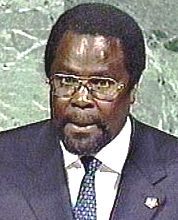INTERVIEW-Darfur rebel rifts are big obstacle for talks – Chad
By Opheera McDoom
SIRTE, Libya, July 3 (Reuters) – Divisions among Darfur’s rebels are the biggest problem facing peace talks and rebel leaders are showing no desire to reach a political solution to the war in western Sudan, neighbouring Chad said on Sunday.
 The talks started last month in the Nigerian capital Abuja, but soon stalled after one of the two rebel groups declared it would not accept Chadian mediation and the other said it wanted Eritrea, at odds with the Sudanese government, to mediate.
The talks started last month in the Nigerian capital Abuja, but soon stalled after one of the two rebel groups declared it would not accept Chadian mediation and the other said it wanted Eritrea, at odds with the Sudanese government, to mediate.
Chad’s foreign minister Nagoum Yamassoum said on the sidelines of a meeting of African foreign ministers in the Libyan town of Sirte that the conflict in Darfur, now in its third year, had cost the budding oil producer Chad tens of millions of dollars.
“The rebels create problems with Chad — what interest do we have in creating problems that would prolong the conflict or the presence of refugees which costs money, adds security risk, damages the environment?” he told Reuters.
The Darfur rebellion has forced more than 200,000 refugees into Chad’s remote eastern desert. Yamassoum said the rebels were creating problems with Chad to try to prolong the conflict.
“They say they don’t want us because we say the truth which is that the rebel political leaders do not want peace,” he said.
“The people who live in Amsterdam, London, Paris … who are in these five-star palaces, who have not even seen Darfur since 5-6 months, and for whom the Darfur, the war, has given some authority, they are received by heads of state — they do not really want that to stop,” he said.
Tens of thousands have been killed and more than 2 million forced from their homes in the fighting in Darfur, which began early in 2003 when rebels took up arms accusing the Khartoum government of neglect of the region and of giving Arab tribes preferential treatment. The United States has called the ensuing violence genocide.
Yamassoum said the lack of consensus among rebel leaders was the biggest obstacle to talks moving forward.
“They are contesting with each other — who are the real leaders? No one knows who they are and that’s been the difficulty with the conflict here since the beginning,” he said. “There is no real leadership of these rebels.”
African foreign ministers were on Sunday discussing Darfur and the expansion of African Union forces there to more than 7,000 troops from around 2,400 currently deployed to monitor a shaky ceasefire agreed last year.
“If the AU is there with 7,000 troops, the security of the civilian population will be greatly improved,” Tabassoum said.
Darfur boasts one of the world’s largest humanitarian operations with more than 11,000 aid workers in a region the size of France. The United Nations is also in the process of deploying more than 10,000 U.N. peacekeepers to Sudan’s south, where a peace deal was signed in January to end more than two decades of a separate civil war there.
Tabassoum denied accusations that Chad was supporting some rebel groups over others to promote rebel divisions.
“If there are Chadian soldiers who sell their arms or equipment to assure their way of lives and defend their land, they sell them individually — you cannot then say that it is the Chadian army who supports the rebels,” he said.
